高一英语上语法(人教版)
(完整版)人教版高中英语必修一语法知识点总结

人教版必修一各单元知识点总结Unit One Friendship一、重点短语1.go through 经历,经受get through 通过;完成;接通电话2. set down 记下,放下3. a series of 一系列4. on purpose 有目的的5. in order to 为了6. at dusk 傍晚,黄昏时刻7. face to face 面对面8. fall in love 爱上9. join in 参加(某个活动);take part in 参加(活动)join 加入(组织,团队,并成为其中一员)10. calm down 冷静下来11. suffer from 遭受12. be/get tired of…对…感到厌倦13. be concerned about 关心14. get on/along well with 与…相处融洽15. be good at/do well in 擅长于…16. find it + adj. to do sth. 发现做某事是…17. no longer / not …any longer 不再…18. too much 太多(后接不可数n.)much too 太…(后接adj.)19. not…until 直到…才20. it’s no pleasure doing sth 做…并不开心21. make sb. sth. 使某人成为…make sb. do sth. 使某人做某事二、语法----直接引语和间接引语概念:直接引语:直接引述别人的原话。
一般前后要加引号。
间接引语:用自己的话转述别人的话。
间接引语在多数情况下可构成宾语从句且不要加引号。
例:Mr. Black said, “ I’m busy.”Mr. Black said that he was busy.变化规则(一)陈述句的变化规则直接引语如果是陈述句,变为间接引语时,用连词that(可省略)引导,从句中的人称、时态、指示代词、时间状语、地点状语都要发生相应的变化。
新人教版高一英语必修一知识点复习整理

新人教版高一英语必修一知识点复习整理1. 语法知识点
- 介词的用法
- 表示时间、地点和方式等
- 注意介词和动词的搭配
- 冠词的用法
- 不定冠词a和an的用法
- 定冠词the的用法
- 名词的单复数形式
- 一般名词的复数形式
- 不规则名词的复数形式
2. 词汇知识点
- 常用动词短语
- 与各种情境相关的常用动词短语
- 包括表示喜欢、讨厌、担心、希望等意思的动词短语
- 常用形容词及副词
- 描述人、事物特征的常用形容词
- 表示时间、程度、方式等的常用副词- 高频词汇
- 重点掌握高频出现的单词和常用短语3. 阅读技巧
- 预测文意
- 根据上下文预测单词或句子的意思
- 联系上下文理解文章
- 通过上下文的线索来理解全文意思
- 抓住文中关键信息
- 注意文章中的重点句子,理解文章主旨4. 写作技巧
- 语法正确性
- 注意动词时态和主谓一致
- 尽量避免语法错误
- 结构完整性
- 确保文章有开头、主体和结尾
- 逻辑连贯性
- 使用适当的连接词
- 使用连接词使句子和句子之间衔接紧密
以上是《新人教版高一英语必修一》的知识点复习整理,希望对你的学习有所帮助。
人教版高一英语必修一Unit-3-语法

(2) 用在状语从句中用一般现在时代替将来时。 If you do that again, I’ll hit you.
(3) 用在I bet 和I hope后面, 常用一般现在时 表将来。 I bet you don’t get up before ten tomorrow. 我敢说你明天不到10点是不会起床的。
③ be to+动词原形:表示按计划要发生的事 或征求对方意见。 Are we to go on with this work?
④ be about to+动词原形,表示即将发生 的动作,不与表示将来的时间状语连用。
I was about to go swimming when my guide shouted at me and told me not to do so. 我正要去游泳, 这时向导大声叫我不要 去。
练一练
1. Betty i_s__le_a_v_i_n_g(leave) for Guangzhou by plane at 3:00 this afternoon. Her brother Bob i_s__s_e_e_in__g(see) her off. It’s half past one now. They _a_re__w__a_it_i_n_g(wait) for a taxi outside the school gate.
⑤ 一般现在时表示将来时 (1) 按规定预计要发生的未来动作,仅限于
动词come, go, leave, move, start, return, arrive, begin, stay等动词. The plane takes off at 10:10. That is, it’s leaving in ten minutes.
高一英语语法知识—非谓语动词人教版知识精讲
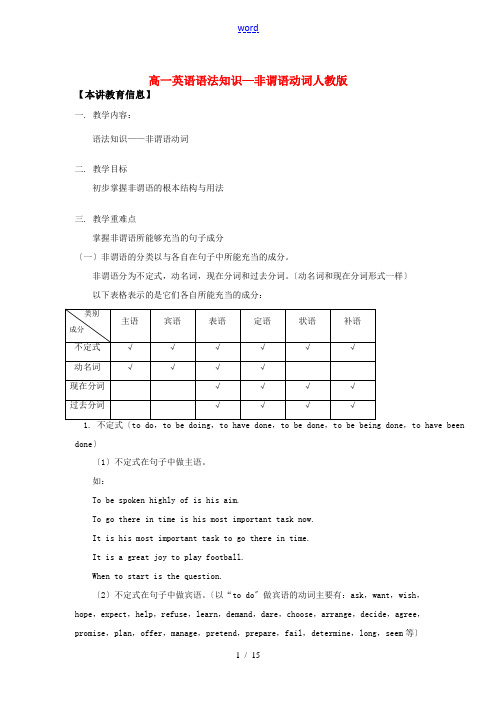
高一英语语法知识—非谓语动词人教版【本讲教育信息】一. 教学内容:语法知识——非谓语动词二. 教学目标初步掌握非谓语的根本结构与用法三. 教学重难点掌握非谓语所能够充当的句子成分〔一〕非谓语的分类以与各自在句子中所能充当的成分。
非谓语分为不定式,动名词,现在分词和过去分词。
〔动名词和现在分词形式一样〕以下表格表示的是它们各自所能充当的成分:,to have been done〕〔1〕不定式在句子中做主语。
如:To be spoken highly of is his aim.To go there in time is his most important task now.It is his most important task to go there in time.It is a great joy to play football.When to start is the question.〔2〕不定式在句子中做宾语。
〔以“to do〞做宾语的动词主要有:ask,want,wish,hope,expect,help,refuse,learn,demand,dare,choose,arrange,decide,agree,promise,plan,offer,manage,pretend,prepare,fail,determine,long,seem等〕如:They pretended to have finished their work.He had planned to finish it in time.They thought it necessary to go to church every weekend.We find it good to have a walk every day.They don’t now where to go.〔3〕不定式在句子中做表语。
如:His dream is to be taught by that famous professor.The only thing he wants to do now is to study hard.His aim is to get the first place in the game.The question is which one to choose.〔4〕不定式在句子中做状语。
人教版高一英语必修一unit1-3的短语和语法

Unit One Friendship一、重点短语1. be good to 对……友好be good for 对……有益;be bad to…/be bad for…2.add up sth 加起来add up to 总计add to 增加;加强(多用于抽象意义)a dd…to…在…中加上….3. get sth done使某物/事被做…4. on purpose 有目的的5. go /be on holiday 休假6. be upset不安upset sb.使某人心烦意乱be/get upset about 为…心烦;为…不安7. face to face 面对面hand in hand 手拉手shoulder by shoulder 肩并肩8. fall in love (with sb.) (同某人)坠入爱河,(与某人)相爱9. join in 参加(某些活动:讨论、游戏、工作、比赛…);take part in 参加(群众性活动、会议等,参加者持积极态度,起一份作用)join 加入(组织,社会团体;参军;并成为其中一员)10. have trouble with sth. have trouble/difficulty in doing11. suffer from 患…病; 受…苦痛;遭受go through遭遇;经历;获准,通过12. be/get tired of…对…感到厌倦13. be concerned about 关心14. get on/along well with 与…相处融洽15. be good at=do well in 擅长于…16. find it + adj. to do sth. 发现做某事是…17. no longer / not …any longer 不再…18. too much +n,(不可数)太多……much too +adj. 太…19. no longer=not …any longer 如今不再……20. it’s no pleasure/use doing sth 做…并不开心/没有用21. make sb. sth. 使某人成为…make sb. do sth. 使某人做某事22. sth happen to sb 某人发生某事sb happen to do sth 某人碰巧做某事It so happened that…. 正巧23.for example, 例如,(具体举一个例子)namely 即,(把例举的事物举完)such as+n./doing诸如…之类(例举事物中的多个例子)二、语法点1.直接引语和间接引语,注意人称、时态、时间状语的变化!2. 强调句型:It is/was+ 强调部分(除谓语外)+that/who+其他部分3. 第…次做…. : It is/ was the fisrt( second…序数词) time+that….have/had done….4. 动名词做定语,与修饰的名词无逻辑上的主谓关系,只表示所修饰名词的一般用途,必须位于名词之前:swimming pool、reading room、hiding place现在分词做定语:与修饰的名词有,逻辑上的主谓关系,表示所修饰名词特征,表修饰的名词正在进行的动作:flying bird、running boy、singing girl….5.with +复合结构,中间可包含副词、现在分词、过去分词、介词短语等,在句子起状语作用。
人教版高一英语必修一unit第1次课词汇与语法讲义
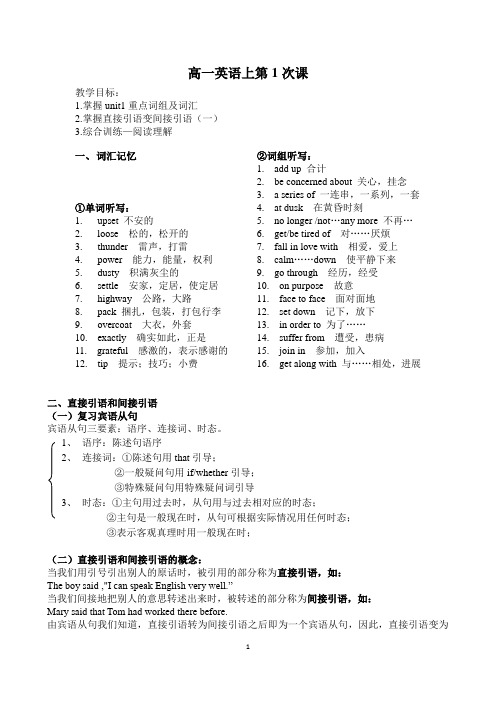
高一英语上第1次课教学目标:1.掌握unit1重点词组及词汇2.掌握直接引语变间接引语(一)3.综合训练—阅读理解一、词汇记忆①单词听写:1. upset 不安的2. loose 松的,松开的3. thunder 雷声,打雷4. power 能力,能量,权利5. dusty 积满灰尘的6. settle 安家,定居,使定居7. highway 公路,大路8. pack 捆扎,包装,打包行李9. overcoat 大衣,外套10. exactly 确实如此,正是11. grateful 感激的,表示感谢的12. tip 提示;技巧;小费②词组听写:1. add up 合计2. be concerned about 关心,挂念3. a series of 一连串,一系列,一套4. at dusk 在黄昏时刻5. no longer /not…any more 不再…6. get/be tired of 对……厌烦7. fall in love with 相爱,爱上8. calm……down 使平静下来9. go through 经历,经受10. on purpose 故意11. face to face 面对面地12. set down 记下,放下13. in order to 为了……14. suffer from 遭受,患病15. join in 参加,加入16. get along with 与……相处,进展二、直接引语和间接引语(一)复习宾语从句宾语从句三要素:语序、连接词、时态。
1、语序:陈述句语序2、连接词:①陈述句用that引导;②一般疑问句用if/whether引导;③特殊疑问句用特殊疑问词引导3、时态:①主句用过去时,从句用与过去相对应的时态;②主句是一般现在时,从句可根据实际情况用任何时态;③表示客观真理时用一般现在时;(二)直接引语和间接引语的概念:当我们用引号引出别人的原话时,被引用的部分称为直接引语,如:The boy said ,"I can speak English very well.”当我们间接地把别人的意思转述出来时,被转述的部分称为间接引语,如:Mary said that Tom had worked there before.由宾语从句我们知道,直接引语转为间接引语之后即为一个宾语从句,因此,直接引语变为间接引语时,人称、时态、引导词、状语和语序都会发生变化。
人教版高中英语必修一知识点+语法总结(全面)
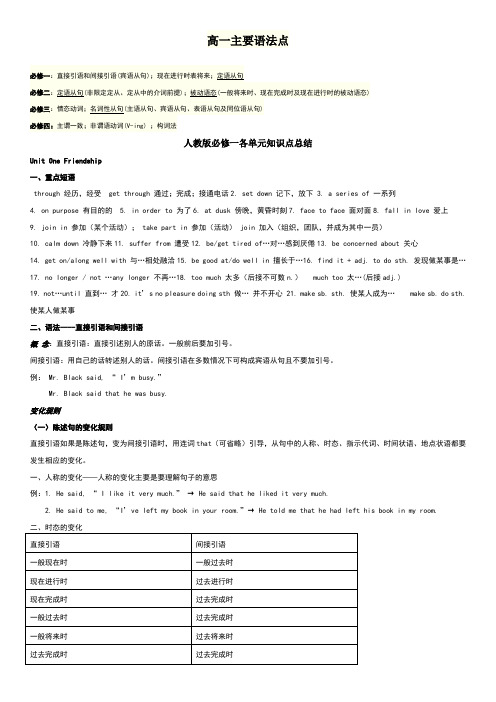
高一主要语法点人教版必修一各单元知识点总结Unit One Friendship一、重点短语through 经历,经受 get through 通过;完成;接通电话2. set down 记下,放下 3. a series of 一系列4. on purpose 有目的的5. in order to 为了6. at dusk 傍晚,黄昏时刻7. face to face 面对面8. fall in love 爱上9. join in 参加(某个活动); take part in 参加(活动) join 加入(组织,团队,并成为其中一员)10. calm down 冷静下来11. suffer from 遭受12. be/get tired of…对…感到厌倦13. be concerned about 关心14. get on/along well with 与…相处融洽15. be good at/do well in 擅长于…16. find it + adj. to do sth. 发现做某事是…17. no longer / not …any longer 不再…18. too much 太多(后接不可数n.) much too 太…(后接adj.)19. not…until 直到… 才20. it’s no pleasure doing sth 做… 并不开心 21. make sb. sth. 使某人成为… make sb. do sth. 使某人做某事二、语法----直接引语和间接引语概念:直接引语:直接引述别人的原话。
一般前后要加引号。
间接引语:用自己的话转述别人的话。
间接引语在多数情况下可构成宾语从句且不要加引号。
例:Mr. Black said, “ I’m busy.”Mr. Black said that he was busy.变化规则(一)陈述句的变化规则直接引语如果是陈述句,变为间接引语时,用连词that(可省略)引导,从句中的人称、时态、指示代词、时间状语、地点状语都要发生相应的变化。
新教材人教版2019英语高一上册必修一welcome unit 语法课件(26张ppt)

1.During the 1990s, American country music has
become more and more popular.
(名词)
2.We often speak English in class. (代词)
3.One-third of the students in this class are girls. 4.To swim in the(r数iv词er)is a great pleasure.
(二) 选出句中谓语的中心词
① I don't like the picture on the wall.
A. don't B. like
C. picture D. wall
② The days get longer and longer when summer comes.
A. get B. longer
• Three thousand people watched the game.
boiled water
后置定语
• There is a man standing at our school gate. • There is a man who stands at our school gate.
He sent the novel to William yesterday.
leave, buy, build, choose, cook, draw, find, get, order, post, save后跟for,例如:
She bought a gift for her mother. (2)复合宾语(宾语+宾补),例如:
注意:系动词(LINKING VERB)用于连接主语和 表语,说明主语的状态,性质特征和身份等。
Unit 3 第3课时 Grammar语法 反意疑问句高一英语必修一(人教版2019)
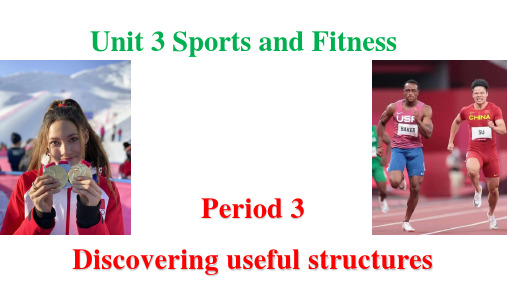
3.陈述句的主语是nobody, no one, everyone, somebody等不定代词时,反意疑问部分的主语多用 he/they。 例:Everyone knows him, don’t they/ doesn’t he? 陈述句的主语something,nothing,anything,everything 等不定代词时,反意疑问部分的主语多用it。 例:Nothing in the world is difficult, is it?
?
4. Everyone should be on time, shouldn’t they ?
5. What he said isn’t true,
is it ?
6. She dislikes sports, doesn’t she ?
7. There was a mountain, wasn’t there ?
— They don’t work hard, do they? — Yes, they do./ No, they don’t.
不,他们工作努力。/ 是的,他们工作不 努力。
2.当陈述句部分是否定结构,反意疑问句用肯定式提问时 ,回答yes或no与汉语的意思正好相反。这种回答时,yes 要翻译为“不”,no翻译为“是” 例:---Lucy didn't attend the meeting, did she? 露西没有参加会议,是吗?
Unit 3 Sports and Fitness
Period 3 Discovering useful structures
All sports for all people. —Pierre de Coubertin
【新教材】人教版(2019)高一英语必修第一册语法知识点复习提纲(全面!)

【新教材】人教版(2019)高一英语必修第一册语法知识点复习提纲(全书语法总览各单元搭配,词组,句型,重难点)全书语法总览Welcome Unit本单元主要语法点句子结构Unit 1 Teenage Life本单元主要语法点名词短语形容词短语和副词短语Unit 2 Travelling Around本单元主要语法点现在进行时表将来Unit 3 Sports and Fitness本单元主要语法点附加疑问句Unit 4 Natural Disasters本单元主要语法点定语从句(一)关系代词的用法Unit 5 Languages around the world本单元主要语法点定语从句(二)关系副词的用法Welcome unit【重点单词】design n. 设计;设计方案 vt. 设计;筹划 ( 教材 P2)(1)design sth. for 为…… 设计某物be designed to do ... 旨在做…… ,用于做……(2)make designs for ... 为…… 做设计by design ( = on purpose) 故意地 ( 反义短语: by accident/by chance 偶然地 ) (3)designer n . 设计者①Our school invited two engineers to design _ a _ language _ lab _ for _ us .我们学校邀请了两位工程师为我们设计一个语言实验室。
②Project Hope is _ designed _ to _ help those children who drop out of school because of poverty.希望工程旨在帮助那些因为贫困而辍学的孩子。
③An Italian architecture designer is to make _ designs _ for the new bridge.一位意大利建筑设计师打算为这座新桥进行设计。
高一英语第一册 语法精讲:V-ing 形式的用法(1)人教版知识精讲

高一英语第一册语法精讲:V-ing 形式的用法(1)人教版【本讲教育信息】一、教学内容v-ing 形式的用法(1)二、知识精讲动名词和现在分词统称为v-ing形式;是非谓语动词的一种。
v-ing形式的各种时态和语态:注:否定式在v-ing前加not。
(一)回忆动名词:是具有名词性质的v-ing形式;或者可以说是由动词变来的名词。
所以我们说动名词和其他的名词一样,在句子中可以作主语,宾语,表语,有时也可作定语。
(二)现在分词:是具有形容词或副词特点的v-ing形式;所以说现在分词在句子中可作定语,宾语补足语,表语和状语。
观察本单元及下单元课文中的一些句子,体会各句中v-ing形式的用法:1. If we are feeling down or lonely, there is nothing better than to see the smiling face of a good friend.如果我们情绪低落或者感到孤独,那么没有比看到好友的笑脸让人感觉更好的事了。
(现在分词作定语时,如果是一个单词,通常位于其修饰的名词之前,即:前置定语)2. In France, a person seeing the same gesture will think it means zero.在法国,有人看到同样的姿势,会以为是零的意思。
(如果是一个短语,要位于其修饰的名词之后,即:后置定语)△讲解:现在分词作定语时,被修饰的名词与现在分词为主谓关系;通常表示正在进行的动作;有时也表示经常性的或持续性的动作。
如:→ a sleeping boy一个正在睡觉的男孩→ the rising sun冉冉升起的太阳→ The man standing at the door will sing us a song.(= The man who is standing at the door …)站在门口的那个男人将为我们唱一首歌。
人教新课标英语高一年级上(必修1、2)语法精讲

高一年级上(必修1、2)语法Ⅰ. 直接引语和间接引语一、一般变化1、如果直接引语是陈述句,变为间接引语时,用连词that引导(that在口语中常省略),从句中的人称、时态、指示代词、时间状语、地点状语等要根据具体情况作相应的变化。
2、如果直接引语是疑问句,变为间接引语时,除了注意人称、时态、指示代词、状语等要作相应的变化外,还要注意以下变化:○1一般疑问句,要用连词whether或if引导;○2.选择疑问句,也可用whether引导;○3.反意疑问句,也可改成用whether引导;○4.特殊疑问句,仍用原来的疑问词引导,将原来的疑问句语序变为陈述句语序。
二、祈使句1、如果直接引语是表示命令、请求的祈使句,变为间接引语时,要将祈使句中的动词原形变成不定式。
如果祈使句是肯定句,变为间接引语时用“ask / tell / order + sb + to do sth”;如果是否定句时,用“ask / tell / order + sb + not to do sth”。
如果直接引语是表示请求的祈使句,间接引语的动词常用ask;如果是表示命令的,间接引语的动词常用tell,order,command等。
2、祈使句变为间接引语的步骤概括如下:○1将主句中的谓语动词(say to,say等)改为tell,ask,order等。
○2将主句中的宾语或直接引语中的呼语变为tell,ask,order的宾语。
○3在祈使句的谓语动词前加to,使其变成动词不定式。
○4去掉引号和please。
eg:“Make sure the door is shut,” she said to her little son.→She told her little son to make sure the door was shut.He said to the girl, “Do it at once.”→He told the girl to do it at once.“Please sing at our party, Mary.” Mrs. Hill said.→Mrs. Hill asked Mary to sing at their party.She said to me, “Don’t smoke in the classroom.”→She told me not to smoke in the classroom.3、表示建议、劝告的祈使句,在变为间接引语时,可用“suggest + 动名词”或“suggest + that sb / sth (should)do”结构。
人教版高一英语语法知识点

人教版高一英语语法知识点人教版高一英语语法学问点raise vt.“使……上升;升起;提高”等;rise vi.“上升;升起”;arise vi.“站起来(stand up)”,“起床(get up)”rise和arise用作站起,起床都属正式用法;arise主要表示“消失、发生”等意思。
She raised her voice in anger. (抬高)The wind raised the fallen leaves from the ground. (刮起)The child rose from the ground and ran to his mother. (=The child raised himself from the ground and ran to his mother.) (爬起)She rises before it is light. (起床)Difficulties will arise as we do the work. (消失) 人教版高一英语语法学问点核心单词1. persuadevt.劝说;劝服;使信任(同convince)常用结构:persuade sb. of sth. 使某人信任某事persuade sb. to do sth. 劝说某人做某事persuade sb. into doing sth. 劝说某人做某事persuade sb. out of doing sth. 劝说某人不要做某事persuade sb. thatclause 使某人信任……联想拓展talk sb. into/out of doing sth.=reason sb. into/out of doing sth.劝说某人做/不做某事trick sb. into/out of doing sth. 诱使某人做/不做某事urge sb. into/out of doing sth. 怂恿某人做/不做某事易混辨析advise/persuadeadvise 强调劝说,建议的动作,不注意结果;而persuade强调已经劝说,重在结果。
人教版高一英语语法知识点总结_高一英语知识点归纳
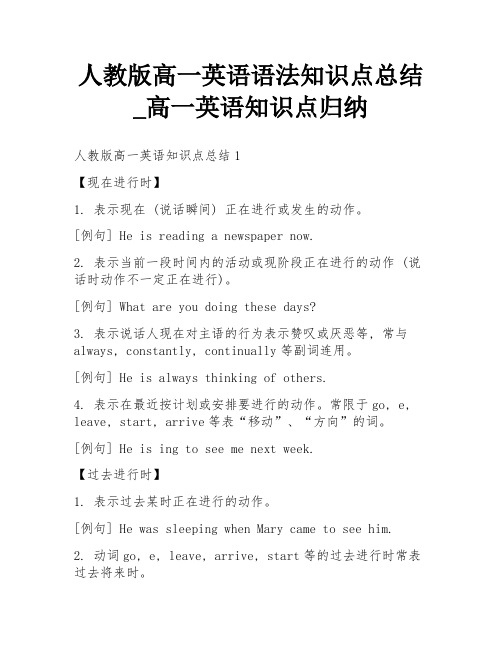
人教版高一英语语法知识点总结_高一英语知识点归纳人教版高一英语知识点总结1【现在进行时】1. 表示现在 (说话瞬间) 正在进行或发生的动作。
[例句] He is reading a newspaper now.2. 表示当前一段时间内的活动或现阶段正在进行的动作 (说话时动作不一定正在进行)。
[例句] What are you doing these days?3. 表示说话人现在对主语的行为表示赞叹或厌恶等, 常与always, constantly, continually等副词连用。
[例句] He is always thinking of others.4. 表示在最近按计划或安排要进行的动作。
常限于go, e, leave, start, arrive等表“移动”、“方向”的词。
[例句] He is ing to see me next week.【过去进行时】1. 表示过去某时正在进行的动作。
[例句] He was sleeping when Mary came to see him.2. 动词go, e, leave, arrive, start等的过去进行时常表过去将来时。
[例句] She said she was going to Beijing the day after tomorrow.人教版高一英语知识点总结2各种时态的被动语态被动语态概述被动语态的概念:它是动词的一种形式,表示主语与谓语之间的执行或被执行关系。
主动语态表示主语是谓语动作的执行者,例如:They saw the little boy crying by the river. 被动语态表示主语是谓语动作的承受者,例如:The little boy was seen crying by the river.被动语态的构成被动语态的形式是由“助动词be+动词的过去分词”构成。
助动词be随着主语的人称、数、时态等的不同而变化。
人教版高中英语必修一Unit4 的语法(定语从句)说课

教学效果
参与程度
为学生创设丰富的语言环境,让学生产生课堂参与的愿望 和机会,使交际具有实际内容和实际意义。对于学生发散 思维能力的培养有很大的帮助。
课堂效果
达到教学目标。活动设计从学生生活经验兴趣爱好出发, 活动形式多样化,有趣味性
自我评价
英语思维与汉语思维同时存在,相互干扰。要继续学习, 不断充电,提升自身的业务素质和人文素养。
groups.
只用that的情况
•当先行词是all, few,none, some,little, •everything, •anything, •nothing ,或 被every, any, all, some, no, little, few, much •等词修饰时
•当先行词被 序数词或形 容词最高级, blow!
Blow what?
Blow a girl/boy who...
给学生输入尽量含who的定语从句。
Part two
The Attributive clause 定语从句
定义:在复合句中,修饰某一名词或
代词的从句。
She is a girl who /that can speak ——————————————————
教学难点 1. 引导词that的特殊用法。 2.学会运用定语从句。
教学步骤
• Step 1 Play a game! • Step 2 Have picture to have truth • Step 3 Summary of the attributive clause • Step 4 Practice • Step 5 Homework.
实物、图片和课件的使用,增强了课堂教 学的直观性和生动性。课件使教学内容丰 富,信息量充足。
人教版高一英语必修一unit 1 Teenage Life 语法讲解

keys:形容词短语 名词短语 副词短语
名师点津:
高中阶段同学们接触比较多的是复 杂的句子结构中的复杂句子成分。 同学们要注意词块和语块的认知, 原来学习中遇到名词,形容词,副 词等可能会以短语的形式出现。
A thousand-mile journey begins with the first step. 千里之行始于足下
本单元重点语法
素养达标:
5. He is in experienced, but he is quite clever._______________ 形容词短语
6. The fruit is good to eat. 形容词短语
7. The servant was afraid to wake up his master. 形容词短语
male beats his chest and charges towards me. loudest
A thousand-mile journey begins with the first step. 千里之行始于足下
A thousand-mile journey begins with the first step. 千里之行始于足下
知识迁移:单句语法填空
1. the researchers had 100______(volunteer)type the word “touch” four times using the smart keyboard. volunteers
人教版高一英语语法总结

人教版高一英语语法总结人教版高一英语语法总结一、名词名词是英语中最基本的词类之一,常用来表示人、动物、事物、地点等,分为可数名词和不可数名词。
可数名词有单数和复数两种形式,单数名词前可以有a或an,而复数名词前通常没有冠词。
1. 可数名词的单数形式和复数形式:单数形式复数形式man menwoman womenchild childrentooth teethfoot feetmouse micesheep sheepfish fishtomato tomatoes2. 不可数名词:一般没有复数形式,不能用a或an修饰,也不能与these、those连用。
二、冠词冠词是用于名词前的词类,分为不定冠词(a和an)和定冠词(the)。
1. 不定冠词不定冠词用于泛指,表示某一类人或物,用于单数可数名词前。
a book a pen a toyan apple an orange an hour2. 定冠词定冠词用于特指,表示特定的人或物,用于名词前。
the book the pen the toythe apple the orange the hour三、代词代词是可以替代名词在句子中起代指作用的词,分为人称代词、物主代词、反身代词、指示代词、不定代词和关系代词等。
1. 人称代词人称代词分为主格形式和宾格形式,主格形式用于作主语,宾格形式用于作宾语或介词宾语。
主格形式宾格形式I meyou youhe himshe herit itwe usthey them2. 物主代词物主代词用于表示所有关系,分为主格形式和宾格形式。
主格形式宾格形式my mineyour yourshis hisher hersits itsour ourstheir theirs3. 反身代词反身代词用于表示动作的反身性质,分为单数和复数两种形式。
单数形式复数形式myself ourselvesyourself yourselveshimself themselvesherselfitself4. 指示代词指示代词用于指示人或物,包括this、that、these、those等。
- 1、下载文档前请自行甄别文档内容的完整性,平台不提供额外的编辑、内容补充、找答案等附加服务。
- 2、"仅部分预览"的文档,不可在线预览部分如存在完整性等问题,可反馈申请退款(可完整预览的文档不适用该条件!)。
- 3、如文档侵犯您的权益,请联系客服反馈,我们会尽快为您处理(人工客服工作时间:9:00-18:30)。
高一英语上语法(人教版)[真诚为您服务]用现在进行时表示将来意为:"意图"、"打算"、"安排"、常用于人。
常用词为come, go, start, arrive, leave, stay等。
I'm leaving tomorrow. Are you staying here till next week? 比较过去时与现在完成时 1)过去时表示过去某时发生的动作或单纯叙述过去的事情,强调动作;现在完成时为过去发生的,强调过去的事情对现在的影响,强调的是影响。
2)过去时常与具体的时间状语连用,而现在完成时通常与模糊的时间状语连用,或无时间状语。
一般过去时的时间状语: yesterday, last week,…ago, in1980, in October, just now, 具体的时间状语共同的时间状语:this morning, tonight,this April, now, once,before, already, recently,lately 现在完成时的时间状语 for, since, so far, ever, never, just, yet, till / until, up to now, in past years, always, 不确定的时间状语 3)现在完成时可表示持续到现在的动作或状态,动词一般是延续性的,如live, teach, learn, work, study, know. 过去时常用的非持续性动词有come, go, leave, start, die, finish, become, get married等。
举例: I saw this film yesterday. (强调看的动作发生过了。
) I have seen this film. (强调对现在的影响,电影的内容已经知道了。
) Why did you get up so early? (强调起床的动作已发生过了。
) Who hasn't handed in his paper? (强调有卷子,可能为不公平竞争。
) She has returned from Paris. 她已从巴黎回来了。
She returned yesterday. 她是昨天回来了。
He has been in the League for three years. (在团内的状态可延续) He has been a League member for three years. (是团员的状态可持续) He joined the League three years ago. ( 三年前入团,joined为短暂行为。
) I have finished my homework now. ---Will somebody go and get Dr. White? ---He's already been sent for. 句子中如有过去时的时间副词(如 yesterday, last, week,in 1960)时,不能使用现在完成时,要用过去时。
(错)Tom has written a letter to his parents last night. (对)Tom wrote a letter to his parents last night. since的四种用法 1) since +过去一个时间点 (如具体的年、月、日期、钟点、1980, last month, half past six)。
I have been here since 1989. 2) since +一段时间+ ago I have been here since five months ago. 3) since +从句 Great changes have taken place since you left. Considerable time has elapsed since we have been here. 4) It is +一段时间+since从句 It is two years since I became a postgraduate student. 延续动词与瞬间动词 1) 用于完成时的区别延续动词表示经验、经历;瞬间动词表示行为的结果,不能与表示段的时间状语连用。
He has completed the work. 他已完成了那项工作。
(表结果) I've known him since then. 我从那时起就认识他了。
(表经历) 2) 用于till / until从句的差异延续动词用于肯定句,表示"做……直到……" 瞬间动词用于否定句,表示"到……,才……" He didn't come back until ten o'clock. 他到10 点才回来。
He slept until ten o'clock. 他一直睡到10点。
典型例题1. You don't need to describe her. I ___ her several times.A. had metB. have metC. metD. meet 答案B. 首先本题后句强调对现在的影响,我知道她的模样,你不用描述。
再次,several times告知为反复发生的动作,因此用现在完成时。
2.---I'm sorry to keep you waiting. ---Oh, not at all. I ___ here only a few minutes.A. have beenB. had beenC. wasD. will be 答案A. 等待的动作由过去开始,持续到现在,应用现在完成时。
用一般过去时代替完成时 1) 两个动作如按顺序发生,又不强调先后,或用then,and,but 等连词时,多用一般过去时。
When she saw the mouse,she screamed. My aunt gave me a hat and I lost it. 2 ) 两个动作相继发生,可用一般过去时;如第一个动作需要若干时间完成,用过去完成时。
When I heard the news, I was very excited. 3) 叙述历史事实,可不用过去完成时,而只用一般过去时。
Our teacher told us that Columbus discovered America in 1492. 不用进行时的动词 1) 事实状态的动词 have, belong, possess, cost, owe, exist, include, contain, matter, weigh, measure, continue I have two brothers. This house belongs to my sister. 2) 心理状态的动词 Know, realize, think see, believe, suppose, imagine, agree, recognize, remember, want, need, forget, prefer, mean, understand, love, hate I need your help. He loves her very much. 3 ) 瞬间动词 accept, receive, complete, finish, give, allow, decide, refuse. I acceptyour advice. 4) 系动词 seem, remain, lie, see, hear, smell, feel, taste, get, become, turn You seem a little tired. 虚拟语气 1)概念虚拟语气用来表示说话人的主观愿望或假想,所说的是一个条件,不一定是事实,或与事实相反。
2)在条件句中的应用条件句可分为两类,一类为真实条件句,一类为非真实条件句。
非真实条件句表示的是假设的或实际可能性不大的情况,故采用虚拟语气。
真实条件句真实条件句用于陈述语气,假设的情况可能发生,其中 if 是如果的意思。
时态关系句型:条件从句主句一般现在时 shall/will + 动词原形 If he comes, he will bring his violin. 典型例题 The volleyball match will be put off if it ___. A. will rain B. rains C. rained D. is rained 答案B。
真实条件句主句为将来时,从句用一般现在时。
注意: 1)在真实条件句中,主句不能用be going to表示将来,该用shall, will. (错) If you leave now, you are never going to regret it. (对) If you leave now, you will never regret it. 2)表示真理时,主句谓语动词便不用shall (will) +动词原形,而直接用一般现在时的动词形式。
非真实条件句 1)时态:可以表示过去,现在和将来的情况。
它的基本特点是时态退后。
a. 同现在事实相反的假设。
句型:条件从句主句一般过去时should( would) +动词原形 If they were here, they would help you. b. 表示于过去事实相反的假设。
句型:条件从句主句过去完成时should(would) have+ 过去分词 If she had worked harder, she would have succeeded. The rice would not have been burnt if you had been more careful. If my lawyer had been here last Saturday, he would have prevented me from going. If he had come yesterday, I should / would have told him about it. 含义:He did not come yesterday, so I did not tell him about it. If he had not been ill and missed many classes, hewould have made greater progress. 含义: He was ill and missed many lessons, so he did not make greater progress. c. 表示对将来的假想句型:条件从句主句一般过去时 should+ 动词原形were+ 不定式 would + 动词原形 should+ 动词原形 If you succeeded, everything would be all right. If you should succeed, everything would be all right. If you were to succeed, everything would be all right. 混合条件句主句与从句的动作发生在不同的时间,这时主,从句谓语动词的虚拟语气形式因时间不同而不同,这叫做混合条件句。
